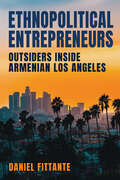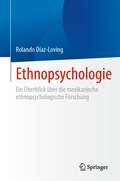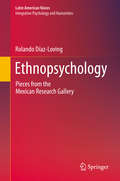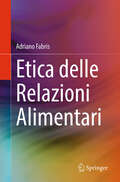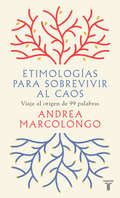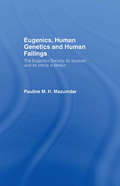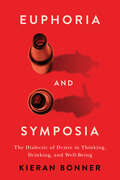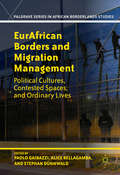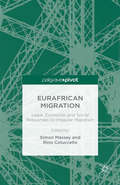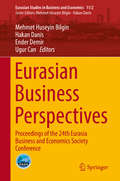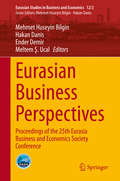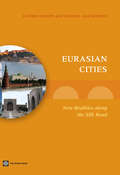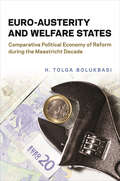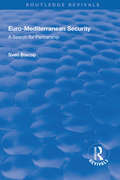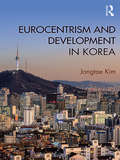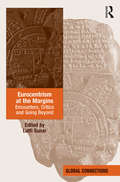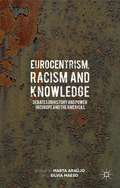- Table View
- List View
Ethnopolitical Entrepreneurs: Outsiders inside Armenian Los Angeles
by Daniel FittanteEthnopolitical Entrepreneurs presents the story of the Armenians of Glendale, California. Coming from Argentina, Armenia, Egypt, Iran, Jordan, Lebanon, Russia, Syria, and many other countries, this group is internally fragmented and often has limited experience with the American political system. Nonetheless, Glendale's Armenians have rapidly mobilized and remade an American suburban space in their own likeness. In telling their story, Daniel Fittante expands our understanding of US political history. From the late nineteenth-century onward, Irish, Italian, Jewish, and several other immigrant populations in large American cities began changing the country's political reality. The author shows how Glendale's Armenians—as well as many other immigrants—are now changing the country's political reality within its dynamic, multiethnic suburbs. The processes look different in various suburban contexts, but the underlying narrative holds: immigrant populations converge on suburban areas and ambitious political actors develop careers by driving coethnics' political incorporation.
Ethnopsychologie: Ein Überblick über die mexikanische ethnopsychologische Forschung
by Rolando Díaz-LovingDieses Buch gibt einen Überblick über die mexikanische Ethnopsychologie, einen originellen theoretischen und methodischen Ansatz, der darauf abzielt, die auf universellen Prinzipien, Prozessen und Konstrukten basierende psychologische Wissenschaft durch wissenschaftliche Methoden zu ergänzen, um die für bestimmte kulturelle Gruppen typischen idiosynkratischen Merkmale und Verhaltensweisen zu untersuchen. Sie schlägt ein historisch-bio-psycho-sozio-kulturelles theoretisches Modell vor, um Forschungsergebnisse zu sozialen, psychologischen, kollektiven und individuellen Phänomenen zu beschreiben.Die Psychologie steht am Scheideweg einer jahrelangen Forschung, bei der der Schwerpunkt auf der internen Validität lag und kontextuelle und kulturelle Variablen kaum beachtet wurden. Es ist von grundlegender Bedeutung, den Weg der internen Validität weiterzuverfolgen und gleichzeitig Fragen der externen Validität einzubeziehen. Die Zunahme indigener Bewegungen und Daten ermöglicht eine gründliche Bewertung der Frage, inwieweit scheinbar universelle Phänomene wirklich universell sind und inwieweit sie idiosynkratische Manifestationen der Kulturen sind, in denen die Mainstream-Forschung betrieben wird.Mexikanische Ethnopsychologen verfolgen diesen Weg schon seit Jahrzehnten, seit der Pionierarbeit von Rogelio Díaz-Guerrero, aber bisher wurde nur wenig über diesen innovativen theoretischen Ansatz in englischer Sprache veröffentlicht. Ethnopsychologie - Stücke aus der mexikanischen Forschungsgalerie füllt diese Lücke, indem es der internationalen Gemeinschaft einen Überblick über die mexikanische Ethnopsychologie gibt und somit ein nützliches Instrument für Verhaltens-, Sozial- und Gesundheitswissenschaftler darstellt, die daran interessiert sind, zu verstehen, wie die Kultur sowohl kollektive als auch individuelle Verhaltensweisen prägt.
Ethnopsychology: Pieces from the Mexican Research Gallery (Latin American Voices)
by Rolando Díaz-LovingThis book presents an overview of Mexican ethnopsychology, an original theoretical and methodological approach that seeks to complement the mainstream psychological science – based on universal principles, processes and constructs – with scientific methods to study the idiosyncratic features and behaviors typical of specific cultural groups. It proposes a historic-bio-psycho-socio-cultural theoretical model to describe research findings of social, psychological, collective and individual phenomena. Psychology is at a crossroads of years of research with stress on internal validity and little attention to contextual and cultural variables. It becomes fundamental to continue on the internal validity track but at the same time incorporate external validity issues. The growth of indigenous movements and data allows for a profound evaluation of the extents to which apparent universal phenomena are truly universal, and to what extent they are idiosyncratic manifestations of the cultures where the mainstream research is conducted. Mexican ethnopsychologists have been following this path for decades, since the pioneer work of Rogelio Díaz-Guerrero, but until now little has been published in English about this innovative theoretical approach. Ethnopsychology – Pieces from the Mexican Research Gallery fills this gap by presenting the international community an overview of Mexican ethnopsychology and thus providing a useful tool to behavioral, social and health scientists interested in understanding how culture shapes both collective and individual behaviors.
Etica delle Relazioni Alimentari
by Adriano FabrisQuesto libro presenta e discute alcuni problemi di fondo che emergono oggi nelle relazioni alimentari e che riguardano i nostri stili di vita. I primi tre capitoli si concentrano sulle questioni che concernono l'alimentazione e sul rapporto con ciò che possiamo o non possiamo mangiare, per motivi etici, religiosi o semplicemente collegati al nostro benessere. Il quarto capitolo tratta dell'atto del bere e del nostro rapporto con l'acqua, nell’ottica della sostenibilità, della giustizia, del corretto uso e dell’equa distribuzione delle risorse idriche. In generale, l’idea che viene sostenuta nel libro è che per gli esseri umani gli atti del mangiare e del bere non dipendono dalla volontà del soggetto, ma si svolgono in contesti di relazione già dati e mettono in gioco, o impediscono, ulteriori relazioni: con altri esseri viventi, con altri esseri umani, con noi stessi. Tali relazioni possono svilupparsi bene oppure male. Se sono attuate male risultano distruttive. Bisogna capire come ciò accade e agire di conseguenza. L’etica ci aiuta a farlo, facendoci riflettere su questi problemi e individuando soluzioni concrete. Scritto per studenti universitari e per studiosi di etiche applicate, il libro è una lettura stimolante e provocatoria anche per un pubblico più ampio.
Etimologías para sobrevivir al caos: Viaje al origen de 99 palabras
by Andrea Marcolongo99 momentos de felicidad etimológica y amor al lenguaje. Las palabras dan forma a nuestra idea del mundo. Cuando elegimos un término con atención ponemos cierto orden en el caos, y esa es también una bonita manera de cuidarnos. Un discurso pobre, impreciso, insípido y sin relieves refleja un pensamiento equivalente. ¿Cómo escapar del desconcierto de la indefinición? ¿Cómo recuperar el sentido de las cosas? Andrea Marcolongo dibuja un atlas etimológico lleno de sorpresas que nos lleva a los orígenes de nuestra historia, revela quiénes hemos sido y nos invita a pensar quiénes queremos ser. Explorar las raíces de los términos, saborear sus matices, asombrarse ante los desplazamientos que han sufrido a través de los siglos y los lugares equivale a trazar la evolución de nuestra lectura del mundo. El arte de reconstruir las etimologías es, por tanto, cualquier cosa menos estéril: es un fin en sí mismo. ¿Desde qué lugar lejano ha viajado cada palabra antes de llegar a nosotros? ¿Qué otros paisajes ha recorrido, influyendo en otros idiomas y moldeándose a su vez? Quizá no haya mejor lección sobre nuestra esencia que la que ofrecen estas viajeras cuya supervivencia depende de la evolución, la mezcla y el movimiento. La crítica ha dicho:«Marcolongo regresa a su punto fuerte, el instinto de la palabra, la búsqueda de las raíces. Es una mente creativa en constante movimiento.»Grazia «Un viaje al aire fresco de las palabras precisas. Y un acto de amor a los seres humanos, que siempre se han reflejado en ellas.»Il Foglio «La autora juega con las palabras como una niña con Lego. Con ligereza, sin obstáculos.»Libero «Se entremezclan los comentarios sabios y las intuiciones íntimas entre destellos sutiles.»Le Monde «La joven helenista publica un viaje lleno de sorpresas a través de un centenar de palabras, guiado por su búsqueda de la autenticidad.»Libération «Marcolongo se salva a sí misma y nos salva recogiendo el néctar de las raíces de las palabras, etimología de la pasión.»France Inter «Una maravillosa búsqueda de los orígenes.»Le Figaro Magazine «Una narradora excepcional, con un estilo claro y refrescante.»Les Échos «Un atlas etimológico entrañable.»Le Figaro «Entre otras cosas descubrirás lo que realmente significa "leer", "traicionar", "globo aerostático", "beso" y "mariposa". Parecen muchas, pero, en realidad, cuando llegues a la última página, te parecerán muy pocas.»Il Foglio
Eugenics, Human Genetics and Human Failings: The Eugenics Society, its sources and its critics in Britain
by Pauline MazumdarThis scholarly and penetrating study of eugenics is a major contribution to our understanding of the complex relation between science, ideology and class.
Euphoria and Symposia: The Dialectic of Desire in Thinking, Drinking, and Well-Being
by Kieran BonnerEuphoria and Symposia explores the relationship between euphoria, desire, and well-being in the human practices of drinking and thinking, both phenomena in which seeking more – more alcohol, more knowledge – can be understood, ambiguously, as simultaneously positive and negative.Drinking leads to both euphoria and depression and is potentially destabilizing for both the individual and the collective. While medical science understands it is risky for our health (dependency, addiction, illness), anthropology sees drinking as contributing to communal celebration (euphoria, sociability). Since health and celebration are both desirable goods, Kieran Bonner suggests that it is this balancing act – our desire for what is better and good, our preference for one thing over another – that creates ambiguity, revealing a grey zone that is fundamental to a fuller understanding of well-being. In a series of case studies, revealing intricacies and ambiguities not usually picked up in typical scientific, philosophical, or sociological discourses, Bonner posits well-being as harmony, requiring nuanced judgments about the various things that humans desire, including wealth, health, beauty, power, vitality, leisure, pleasure, love, and wisdom.Informed by a creative synthesis of Socratic interrogation, hermeneutic perspectives drawn from post-phenomenological thinkers such as Hans-Georg Gadamer and Hannah Arendt, and distinctive perspectives found in the tradition of reflexive sociology, Euphoria and Symposia asserts that reconciling unlimited desire with the finite nature of the human condition is essential for the understanding and enjoyment of life itself.
Euphorias in Gender, Sex and Sexuality Variations: Positive Experiences
by Tiffany JonesThis Open Access book uses the concept of ‘euphoria’ to investigate when, why and how marginal gender, sex and sexuality groups have positive experiences of their diverse variations even within repressive and disordering contexts. Drawing on data from multiple online surveys including a study of 2,407 LGBTQ+ people and a study of 272 people with intersex variations, it names and offers a new ecological framework for understanding participants’ influences on and barriers to euphorias, asserting the subversive possibilities of being euphorically queer, as opposed to euphoric and queer. The author argues that it is the particularities of negative internal, socio-cultural and institutional contexts for a marginal group or groups that contributes towards the possibilities that shape their potential euphoric feelings and experiences. Ultimately, she calls for a more expansive focus in gender and sexuality studies to show the complex effects of dysphoria and repression on the possibilities of pleasure and joy.This book will be of interest to scholars across Gender, Sexuality and Queer Studies.
EurAfrican Borders and Migration Management: Political Cultures, Contested Spaces, and Ordinary Lives (Palgrave Series in African Borderlands Studies)
by Paolo Gaibazzi, Stephan Dünnwald and Alice BellagambaThis volume traces the African ramifications of Europe’s southern border. While the Mediterranean Sea has become the main stage for the current play and tragedy between European borders and African migrants, Europe’s southern border has also been “offshored” to Africa, mainly through cooperation agreements with countries of transit and origin. By bringing into conversation case studies from different countries and disciplines, this volume seeks to open a window on the backstage of this externalization of borders. It casts light on the sites – from consulates to open seas and deserts – in which Europe’s southern border is made and unmade as an African reality, yielding what the editors call "EurAfrican borders." It further describes the multiple actors – state agents, migrants, smugglers, activists, etc. – that variously imagine, construct, cross or contest these borders, and situates their encounters within the history of uneven exchanges between Africa and Europe.
Eurafrican Migration: Legal, Economic and Social Responses to Irregular Migration
by Rino Coluccello Simon MasseyInformed by witness testimonies, Eurafrican Migration details how the perilous journeys undertaken by irregular migrants are enabled by complex networks of guides during the Sahara phase, and explores the relationship between migrants and the criminal groups who arrange for them to be transported across the sea to southern Europe.
Eurasia at the Dawn of History
by Fernández-Götz Manuel Dirk KrausseOur current world is characterized by life in cities, the existence of social inequalities, and increasing individualization. When and how did these phenomena arise? What was the social and economic background for the development of hierarchies and the first cities? The authors of this volume analyze the processes of centralization, cultural interaction, and social differentiation that led to the development of the first urban centres and early state formations of ancient Eurasia, from the Atlantic coasts to China. The chronological framework spans a period from the Neolithic to the Late Iron Age, with a special focus on the early first millennium BC. By adopting an interdisciplinary approach structured around the concepts of identity and materiality, this book addresses the appearance of a range of key phenomena that continue to shape our world.
Eurasian Business Perspectives: Proceedings of the 24th Eurasia Business and Economics Society Conference (Eurasian Studies in Business and Economics #11/2)
by Mehmet Huseyin Bilgin Hakan Danis Ender Demir Ugur CanThis volume of Eurasian Studies in Business and Economics includes selected papers from the 24th Eurasia Business and Economics Society (EBES) Conference, held in Bangkok. The theoretical and empirical papers gathered here cover diverse areas of business and management from different geographic regions; yet the main focus is on the latest findings on evolving marketing methods, analytics, communication standards, and their effects on customer value and engagement. The volume also includes related studies that analyze sustainable consumer behavior, and business strategy-related topics such as cross-border restructuring, quality management standards, and the internationalization of SMEs.
Eurasian Business Perspectives: Proceedings of the 25th Eurasia Business and Economics Society Conference (Eurasian Studies in Business and Economics #12/2)
by Mehmet Huseyin Bilgin Hakan Danis Ender Demir Meltem Ş. UcalThis volume of Eurasian Studies in Business and Economics presents selected theoretical and empirical papers from the 25th Eurasia Business and Economics Society (EBES) Conference, held in Berlin, Germany, in May 2018. Covering diverse areas of business and management from different geographic regions, the book focuses on current topics such as consumer engagement, consumer loyalty, travel blogging, and AirBnB's marketing communication strategy, as well as healthcare project evaluation and Industry 4.0. It also includes related studies that analyze accounting and finance aspects like bank reliability and the bankruptcy risks of equity crowdfunding start-ups.
Eurasian Cities: New Realities along the Silk Road
by Charles Kunaka Souleymane Coulibaly Uwe Deichmann William R. Dillinger Marcel Ionescu-Heroiu Ioannis N. Kessides Daniel SaslavskyThis report responds to pressing questions for policymakers in Eurasian cities and national governments. Faced with changing economic circumstances and a reorientation of trade toward Europe and Asia, will Eurasia's cities be able to adjust? Will some cities be granted the flexible regulations and supportive policies necessary for growth? And will some be permitted to shrink and their people assisted in finding prosperity elsewhere in the region?Even as Eurasian cities diverge, they face shared challenges. Policymakers have a key role in assisting spatial restructuring, particularly in addressing imperfect information and coordination failures. They can do so by rethinking cities, better planning them, better connecting them, greening them and finding new ways to finance these changes. Eurasian cities will also have to find the right balance between markets and institutions to become sustainable. As the World Development Report 2009: Reshaping Economic Geography illustrates, Eurasia (excluding Russia) is a 3D region- a region with low density, long distance, and many divisions. Securing accessibility to leading regional markets such as China, India, and Russia is thus critical. This will require key institutions to be developed to unite the countries, key connective infrastructures to be established between domestic and regional markets, and targeted interventions to be undertaken to compensate countries for short-term losses from this deepened economic integration. Policymakers at the highest levels in these countries should put accessibility at the top of their agendas.
Euro-Austerity and Welfare States: Comparative Political Economy of Reform during the Maastricht Decade (European Union Studies)
by H. Tolga BolukbasiEuro-Austerity and Welfare States analyses the political economy of welfare state reform in the first episode of Euro-austerity during the 1990s. It shows how Europe’s welfare states survived unrelenting pressures stemming from the Economic and Monetary Union (EMU) laid out in the Maastricht Treaty of 1992. Throughout, H. Tolga Bolukbasi draws lessons for scholars and policy practitioners, and his insightful analysis sheds important light on the second wave of Euro-austerity that set in following the Great Recession of 2008. Paying careful attention to government expenditures and budgetary politics, Bolukbasi analyses the political economy of reform in countries where the EMU’s impact was expected to be greatest. Based on in-depth comparative case studies of Belgium, Greece, and Italy, he shows how scholars, policymakers, and citizens alike expected Euro-austerity to erode Europe’s welfare states. Contrary to popular opinion, Bolukbasi finds that the reality was much more complicated. A thorough critique of the "Euro-austerity hypothesis," this book presents a rigorous comparative study of the resilience of the welfare state in various national contexts.
Euro-Mediterranean Security: A Search for Partnership (Routledge Revivals Ser.)
by Sven BiscopThis title was first published in 2003. This work provides a clearer understanding of the EU's approach towards security in the Mediterranean. After examining the EU's interests and the potential threats to security in the region, it analyzes EU security policy towards the region as a whole, through the Euro-Mediterranean Partnership, and towards all disputes and conflicts in the area. It recommends opening up the European Security and Defence Policy to Mediterranean participation, in order to establish a deep and equitable security partnership between both shores. The book argues that this way the EU could implement its innovative comprehensive and co-operative approach to security. Rather than focusing on the military aspect alone, this approach takes into account all dimensions of security (political, socio-economic, cultural and ecological) and is based on partnership rather than confrontation. It therefore contrasts quite sharply with the policies advocated in the US National Security Strategy.
Eurocentrism and Development in Korea (Routledge Studies in Emerging Societies)
by Jongtae KimUnder the global hegemony of the West, societies have interpreted the world and defined their identities through the frameworks of Eurocentric discourses. Since the mid-twentieth century, Eurocentrism has tended to be associated with economic developmentalism. The discourse of seonjinguk (developed country) has been a dominant Eurocentric developmental discourse in Korea. However, in what historical contexts have the Koreans set seonjinguk as their national goal and yardstick to judge nations? What roles have been played by the concept of seonjinguk in Korea? What discursive frameworks did the Koreans use for their national identities and worldviews before the developmental era? Eurocentrism and Development in Korea is the first scholarly approach to those questions. Through a chronological analysis of Korea’s dominant discourses from the late nineteenth century to the present, Kim demonstrates the historical nature of developmentalism and seonjinguk discourse for Korea’s developmental era, and traces their genealogy to gaehwa (enlightenment) and munmyeong (civilization) discourses from a sociological historical perspective. Providing essential knowledge about Korea’s history of Eurocentrism, developmentalism and national change, this enlightening monograph will appeal to undergraduate and postgraduate students, as well as postdoctoral researchers, interested in fields such as Korean Studies, Development Studies and Global Sociology.
Eurocentrism at the Margins: Encounters, Critics and Going Beyond (Global Connections)
by Lutfi SunarEurocentrism remains a prevailing feature of Western-dominated social scientific perspectives, tending to ignore alternative views originating outside the West and thus maintaining a form of scholarly hegemony. As such, there is an urgent need to reconsider Eurocentrism in social science, to ask whether it constitutes an obstacle to understanding social problems and whether it is possible to go beyond Eurocentrism in the construction of reliable, more universal knowledge. At the same time, certain questions persist, particularly with regard to the extent to which recent revisionist challenges have really contributed to the surmounting of Eurocentric domination, and whether the constant repetition of the concept serves to reinforce it. This book engages with the central problems of Eurocentrism in the social sciences, bringing together the work of scholars from around the world to offer a critique of this perspective from both European and non-European positions, thus shedding light on the binaries that often come into being in debates in this field. Thematically organised and addressing a range of questions, including Eurocentrism in historical studies, in the understanding of religion and civilisation and in the study of international relations, as well as in the institutionalisation and professionalisation of research and discourses on modernisation in the Middle East, Eurocentrism at the Margins will appeal to scholars with interests in knowledge production and circulation, and Eurocentrism and post-colonialism in the social sciences.
Eurocentrism, Racism and Knowledge: Debates on History and Power in Europe and the Americas
by Marta Araújo Silvia Rodríguez MaesoThis collection addresses key issues in the critique of Eurocentrism and racism regarding debates on the production of knowledge, historical narratives and memories in Europe and the Americas. Contributors explore the history of liberation politics as well as academic and political reaction through formulas of accommodation that re-centre the West.
Eurocentrism: A Marxian Critical Realist Critique
by Nick HostettlerThe political and social structures of modernity are dominated by really eurocentric forms and relations, yet the theorisation of the eurocentricity of modernity remains barely developed. At the same time, modern political and social theory is fundamentally eurocentric, yet the critique of eurocentrism remains marginal to marxian and critical realist theory. Addressing the eurocentrism of both modernity and modern theory, Eurocentrism: A Marxian Critical Realist Critique discloses the deeply embedded constraints it imposes on historical and social reflexivity. Building on the insights of post-structuralism and post-colonialism, Eurocentrism shows how the powerful anti-eurocentric tendencies of the marxian critique of civil society and the critical realist critique of philosophy have been misunderstood or ignored. It develops the latent potential of these traditions to develop a systematically anti-eurocentric approach to understanding and explaining modernity.
Eurojihad
by Cheryl Benard Angel RabasaThroughout history, factors of radicalization have involved social and economic conditions and issues of identity. Patterns of Islamist radicalization in Europe reflect the historical experience of European Muslim communities, particularly their links to their home countries, the prevalence of militant groups there, and the extent to which factors of radicalization in Muslim countries transfer to European Muslim diasporas. Eurojihad examines the sources of radicalization in Muslim communities in Europe and the responses of European governments and societies. In an effort to understand the scope and dynamics of Islamist extremism and terrorism in Europe, this book takes into account recent developments, in particular the emergence of Syria as a major destination of European jihadists. Angel Rabasa and Cheryl Benard describe the history, methods and evolution of jihadist networks in Europe with particular nuance, providing a useful primer for the layperson and a sophisticated analysis for the expert.
Europa und die deutsche Frage: Wiederkehr der Geschichte?
by Luc KerrenMit der Wiedervereinigung schien die deutsche Frage, welche bis 1990 über Jahrhunderte das europäische Mächtegleichgewicht bestimmt hatte, eine endgültige Antwort erhalten zu haben, da das Land in der Mitte des Kontinents erstmals in seiner Geschichte „von Freunden umzingelt“ war. Spätestens mit dem Aufkommen der Eurokrise verdeutlichte sich jedoch, dass die Größe und Stärke des vereinten Deutschlands innerhalb Europas weiterhin als ambivalent wahrgenommen wurde: Einerseits kam es nicht umher, als „unverzichtbare Nation“ die Initiative zu übernehmen, gleichzeitig wurde es aber verdächtigt, hegemoniale Ambitionen an den Tag zu legen. Luc Kerren zeigt in diesem Buch, dass dieses Muster in der Folge ebenfalls während der Migrationskrise 2015/16 sowie im Verhältnis zu Russland zu beobachten war. Somit ist auch die Berliner Republik mit der Herausforderung konfrontiert, innerhalb Europas die Balance zu wahren: Zwischen einer „rücksichtslosen Führung“ und einer „führungslosen Rücksicht“.
Europaarbeit der Gewerkschaft ver.di: Eine feldtheoretische Perspektive (Europa – Politik – Gesellschaft)
by Nele DittmarIn der sozialwissenschaftlichen Debatte wird oft ein pessimistisches Bild der Bedingungen und Perspektiven europäischen gewerkschaftlichen Handelns gezeichnet. Selten wurde aber bisher in eine nationale Gewerkschaft hineingeschaut und gefragt, ob und inwiefern die innergewerkschaftlichen (Macht-)Verhältnisse ihre europabezogene Arbeit beeinflussen. Diese Arbeit setzt dort an und lenkt auf der Suche nach den Möglichkeiten und Grenzen gewerkschaftlicher Interessenvertretung in Europa den Blick in eine nationale Gewerkschaft hinein. Am Beispiel der Vereinten Dienstleistungsgewerkschaft ver.di bringt dies einerseits europabezogene Praktiken zum Vorschein, die aus einer Makroperspektive verdeckt bleiben. Andererseits werden neue Erkenntnisse zu Hindernissen gewerkschaftlicher Europaarbeit gewonnen, die in den innerorganisatorischen Strukturen und Machtrelationen selbst begründet sind. Für den Blick in die Gewerkschaft wird in dieser Arbeit eine feldtheoretische Perspektive eingenommen. Damit wird ihre „Europaarbeit“ durch das Zusammenspiel der Position der Gewerkschaft in anderen Feldern (wie dem der deutschen und der europäischen Arbeitsbeziehungen) und den Kräfteverhältnissen innerhalb der Gewerkschaft selbst erklärt.
Europas Zivilgesellschaft in der Wirtschafts- und Finanzkrise: Protest, Resilienz Und Kämpfe Um Deutungshoheit (Bürgergesellschaft und Demokratie)
by Jochen Roose Moritz Sommer Franziska SchollDer Sammelband beleuchtet unterschiedliche Perspektiven auf zivilgesellschaftliche Akteure in der europäischen Wirtschafts- und Finanzkrise und ordnet diese theoretisch ein. Dabei geht der Blick auf zivilgesellschaftliche Aspekte in seiner ganzen Breite. Er betrachtet Dynamiken der öffentlichen Auseinandersetzung, zivilgesellschaftliche Resilienz mit (oft lokalen) Initiativen zur Bearbeitung der Krisenfolgen und transnationaler Solidarität sowie Proteste, Protestorganisationen und Protestparteien. Dabei richtet sich der Blick auf die südlichen Krisenländer, aber auch auf Deutschland. Insbesondere gehen aktuelle Ergebnisse derzeit laufender, zum Teil international vergleichender Forschungsprojekte in den Band ein.Der Inhalt• Krisendiskurse und kollektive Deutungsmuster• Zivilgesellschaftliche Akteure in der Krise• Implikationen für die BewegungsforschungDie ZielgruppenDer Band ist relevant für alle, die sich mit der Entwicklung Europas und der Zivilgesellschaft beschäftigen. Er bietet aktuelle Forschungsergebnisse für Wissenschaftler/innen, Studierende und interessierte Laien in den Feldern Bewegungsforschung, Politikwissenschaft, Soziologie, Kulturwissenschaft und Europawissenschaft, insbesondere Südeuropa.Die HerausgeberDr. Jochen Roose ist wissenschaftlicher Mitarbeiter am Deutschen Institut für Urbanistik, assoziierter Wissenschaftler am Institut für Protest und Bewegungsforschung und Privatdozent an der Freien Universität Berlin. Moritz Sommer promoviert am Institut für Soziologie der Freien Universität Berlin und ist Leiter der Geschäftsstelle des Instituts für Protest- und Bewegungsforschung.Franziska Scholl ist assoziierte Wissenschaftlerin des Instituts für Protest- und Bewegungsforschung.
